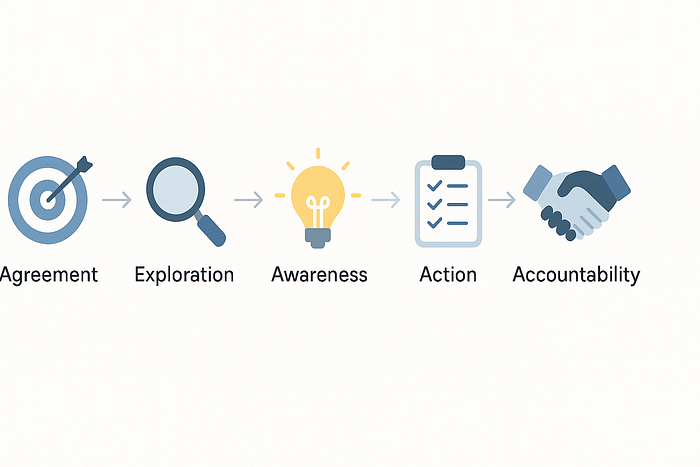In an age of advice overload, real coaching is not about telling you what to do — it’s about helping you think clearly, act intentionally, and grow sustainably with a credentialed partner by your side.

In today’s world, the term “coaching” is everywhere. It’s on social media. In HR conversations. In corporate training catalogs. Everyone seems to be a coach — or calling themselves one.
But not all coaching is created equal.
If you’ve ever walked away from a coaching session feeling like you just received a lecture, therapy session, or a to-do list, chances are what you experienced wasn’t coaching in the professional sense. It may have been mentoring, consulting, counseling — or just someone talking at you.
So what does real coaching look like? How do you know if it’s the right fit for you? And how do you find a coach who can truly support your growth?
Let’s unpack it.
What Is Professional Coaching, Really?
According to the International Coaching Federation (ICF) — the world’s leading body in professional coaching — coaching is defined as:
“Partnering with clients in a thought-provoking and creative process that inspires them to maximize their personal and professional potential.”
It sounds elegant, but what does that really mean?
Real coaching isn’t:
- Telling you what to do
- Solving your problems for you
- Sharing their success stories so you copy them
- Giving you tools without context
Real coaching is:
- Asking powerful, open-ended questions
- Listening deeply, without judgment or agenda
- Helping you uncover your own blind spots
- Challenging your thinking with compassion
- Holding you accountable to the goals you set
Professional coaching is about building self-awareness, clarity, and ownership. It helps you see more clearly, choose more consciously, and act more courageously.
The ICF Standard: Why Credentials Matter
With the coaching industry booming, many people offer coaching services after a weekend course — or worse, no training at all.
That’s why it’s critical to look for ICF-credentialed coaches:
- ACC (Associate Certified Coach) — for early-career professionals trained and assessed by ICF-accredited programs.
- PCC (Professional Certified Coach) — more experienced coaches with a minimum of 500+ hours of client coaching.
- MCC (Master Certified Coach) — the highest standard, reflecting mastery of coaching presence and deep transformation.
ICF coaches are held to a global Code of Ethics and demonstrate 8 core competencies that go beyond “feel-good” talk. You can verify credentials directly on the ICF website.
What Happens in a Real Coaching Session?
Every coach has a slightly different style, but a typical professional coaching session often includes:
- Agreement — You and the coach clarify what success looks like for the session.
- Exploration — Through questions, reflection, and silence, you unpack what’s beneath the surface.
- Awareness — You gain insight into your patterns, beliefs, assumptions.
- Action — You identify next steps or shifts that feel authentic and actionable.
- Accountability — You commit to what you’ll try, change, or reflect on before the next session.
There’s no agenda imposed on you. The coach holds space. You lead your growth.
Coaching vs. Mentoring vs. Consulting vs. Therapy

Many coaches integrate light mentoring or tools when appropriate — but always with permission and clear boundaries.
How to Choose the Right Coach for You
Choosing a coach is like choosing a thinking partner for your next life chapter. Here’s how to do it wisely:

This is non-negotiable. It ensures the coach is trained, experienced, supervised, and committed to a global ethical standard.

Are you looking for personal clarity? Career transition? Leadership presence? Team dynamics? Choose a coach who has experience in your growth area.

Most coaches offer a free discovery session. Use this time to ask:
- Do I feel safe and challenged?
- Does this person listen or just talk?
- Are they truly curious about me?
Coaching works when there’s trust, stretch, and a sense of commitment from both sides.

Some coaches are more intuitive, others structured. Some bring frameworks, others work with metaphors. There’s no one best style — only what works for you.

Look for past client feedback. Bonus if they’ve coached people in similar industries, cultures, or contexts.
What Real Impact Looks Like
When coaching works, you might notice:
- You make decisions faster and with more confidence
- You stop outsourcing your self-worth to titles or outcomes
- You speak up more clearly, even in difficult rooms
- You feel more aligned with who you are — not just what you do
It’s not magic. It’s the result of intentional, focused partnership.
And sometimes, just one powerful question can shift an entire career.
Final Thought: Coaching Is Not a Luxury — It’s a Leadership Essential
In a fast-changing, noisy, pressure-filled world, the most overlooked resource is your own clarity.
Coaching is the space to reclaim that clarity.
And when done right — with a credentialed, skilled, and present coach by your side — it doesn’t just change your career. It changes your relationship with yourself.
So if you’re ready to move from autopilot to authorship, don’t just look for a coach.
Choose the right one.


